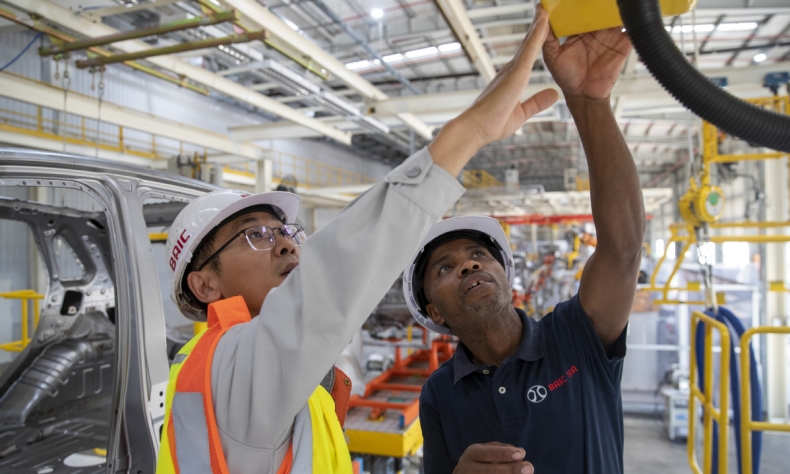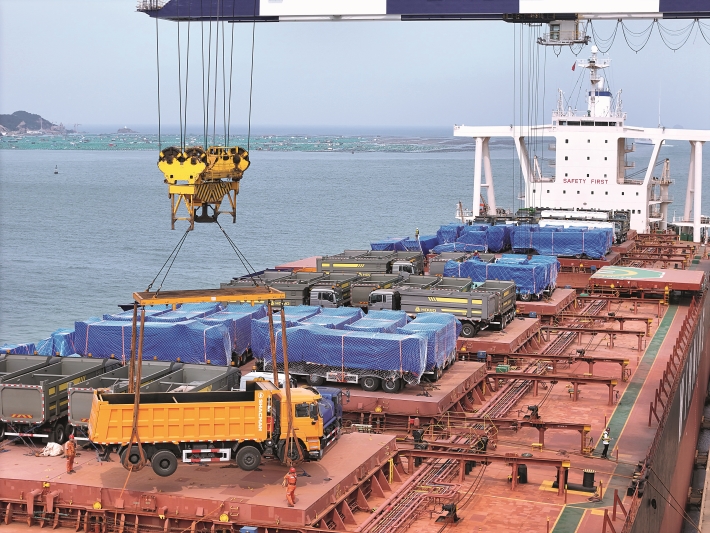Partnership for Modernisation

The cooperation between China and Africa will never be a one-way lane with one being the giver and the other recipient, but rather a mutually beneficial partnership with active contribution from both sides.
The 2024 Beijing Summit of the Forum on China-Africa Cooperation (FOCAC) marks another grand gathering of the China-Africa family, following the previous summits in 2006 in Beijing, 2015 in Johannesburg, and 2018 in Beijing. It also stood out as the largest diplomatic event China has hosted in recent years, with the highest number of attending foreign leaders.
In his keynote address at the opening ceremony, Chinese President Xi Jinping pointed out that “China and Africa account for one-third of the world population. Without our modernisation, there will be no global modernisation. In the next three years, China will work with Africa to take 10 partnership actions for modernisation to deepen China-Africa cooperation and spearhead the Global South modernisation.”
Higher level of cooperation
At this year’s summit, China elevated its bilateral relations with African countries which have diplomatic ties with China to the level of strategic relations, highlighting Africa’s growing importance in China’s foreign policy. Developing countries have long been considered as the foundation of China’s foreign relations, and African countries are of exceptional importance among them.
As today’s world is undergoing great changes not seen in a century, shaped by evolving power dynamics and competition between major nations, the growing strength of the Global South and the momentum of South-South cooperation will inevitably lead to shifts in global power structures. China, being the world’s largest developing country and an unquestionable member of the Global South, along with Africa, the continent with the most developing nations and the largest concentration of Global South countries, represent the unity of the Global South. The solidarity between China and Africa, therefore, reflects the rising strength of developing countries as a whole.
Concrete actions
As nations having endured foreign invasion and later embarking on the path of modernisation, neither China nor African countries can follow the Western model, which was built on the suffering and exploitation of the Global South countries. Over the past 40 years, China has charted its own course, accumulating rich experience in reform, opening up, and governance, leading to significant achievements. China is willing to strengthen the exchanges of governance experience with African countries and jointly pursue modernisation.
The partnership action for mutual learning between civilisations is at the forefront of the 10 partnership actions adopted at this year’s summit.
Many of these actions focus on promoting modernisation that is open and win-win, with specific plans targeting areas like trade, industrial chain, connectivity, development, health, agriculture and livelihood. Moreover, each action plan comes with concrete targets, showing that China-Africa cooperation is an “action-oriented” partnership, rather than mere rhetoric.

China and Africa should jointly advance modernisation featuring diversity and inclusiveness. Both China and Africa are cradles of human civilisation, with rich and ancient cultural heritage. Thus, China is willing to strengthen cultural exchanges with African nations, advocating for mutual respect and coexistence among different civilisations in the process of achieving modernisation. Together, we will foster more meaningful outcomes under the Global Civilisation Initiative. The partnership initiative for people-to-people exchanges focuses on talent cultivation in Africa. China will offer 60,000 training opportunities to Africa, with priorities given to programmes for women empowerment and youth development.
We should jointly advance modernisation that is eco-friendly. In China’s modernisation process, “green development” serves as the cornerstone. Africa, with its vast tropical rainforests and abundant biodiversity, must pursue development without sacrificing these natural treasures. In recent years, China has made significant strides in new energy and green economy sectors, with products like new energy vehicles, lithium batteries, and photovoltaic technologies becoming key exports. These green energy solutions are increasingly popular in African countries and play a significant role in supporting Africa’s transition to a green, low-carbon economy.
Modernisation cannot be realised without a peaceful and stable environment for development. China follows the path of peaceful development to achieve modernisation. Therefore, we should jointly promote modernisation underpinned by peace and security.
Trade prosperity
The cooperation between China and Africa will never be a one-way lane with one being the giver and the other recipient, but rather a mutually beneficial partnership with active contribution from both sides. Chinese companies can seize new opportunities by deeply participating in the 10 partnership actions, helping to further penetrate the African market. For example, Chinese enterprises can be actively involved in the production, processing, and trading of African agricultural, livestock, and fishery products.
Over the past 20 years, numerous Chinese private enterprises have successfully established private farms, medium to large shopping malls, and supermarkets in Africa. With the launch of the China-Africa Partnership Action for Trade Prosperity, opportunities and business prospects are only expected to grow.
Chinese enterprises investing and operating in Africa have not only expanded their own business, but also played a pioneering role in promoting African industrialisation. Moving forward, under the framework of the Partnership Action for Industrial Chain Cooperation, the two sides can collaborate to foster pilot zones for China-Africa in-depth economic and trade cooperation, and carry on African SME empowerment programmes to drive technological innovation and industrial transformation.
It will undoubtedly help Chinese companies operating in sectors like new energy, digital economy, environmental technology, and smart city and smart factory construction to explore vast market opportunities in Africa. These areas are poised for significant development, and Chinese businesses are well-positioned to be key drivers of this transformation.
The author is Adjunct Research Fellow, Zhejiang Yuexiu University, and Researcher, China-Africa Institute.
 Facebook
Facebook
 Twitter
Twitter
 Linkedin
Linkedin
 Google +
Google +










